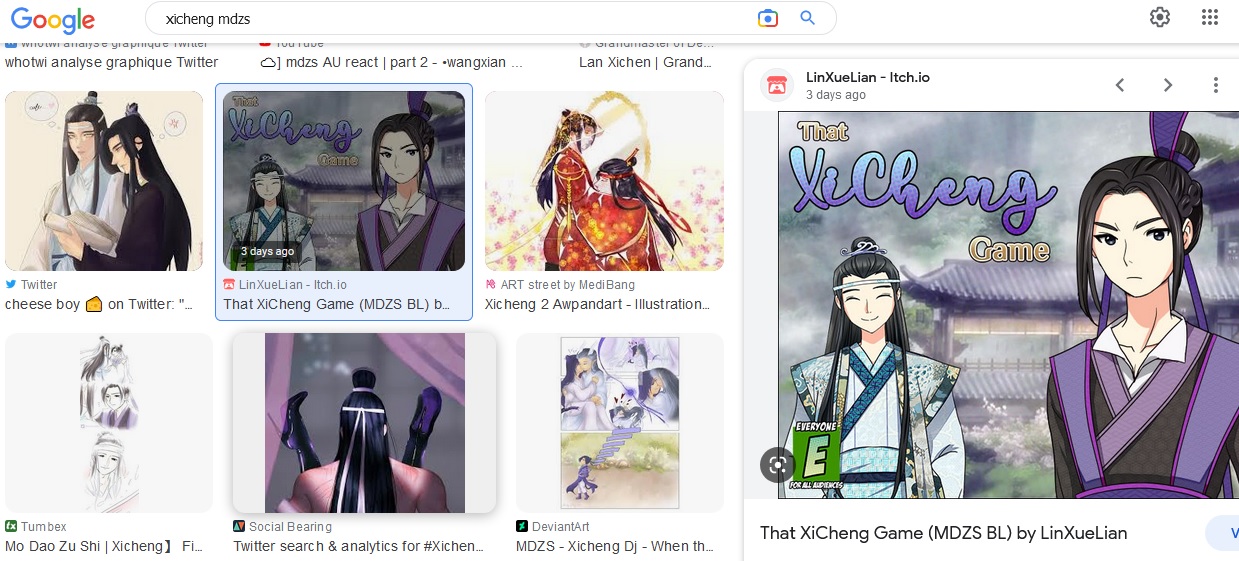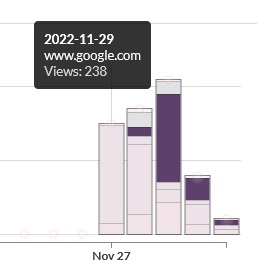So here's why it's not a bad idea to tag and label fangames in a specific way (meta tags & analytics)
A few days ago, I posted this game and linked to it from Twitter, Tumblr and Reddit. While I was expecting most hits to come from these three (and indeed Twitter has played the biggest part in getting it the most views and clicks), a surprising result appeared right under Twitter.

I was legitimately scratching my head at this one. I couldn't figure it out - Google hides its link referrals so it's collectively grouped under google.com in the analytics page; you wouldn't know why a link to your game is there. If someone has linked to my game from Facebook (and yes, I've noticed in the analytics that some people have actually shared the game in Facebook), it wouldn't appear as a Google search thing. You'd first have to enter Facebook and click on their link, turning their referral into an lm.facebook one.
Being the curious cat I was, I decided to sleuth a bit. As far as experience goes, people don't look for just "mdzs" in search tags when looking for something to consume. I know I primarily use pairing filters in AO3 and stick to just one or two pairings I like, and typically we tend to tag stuff by pairing name so they can be found by the pool of fans who're also looking for that content.
Since this was a XiCheng game, I looked up the keywords, "xicheng" and added "mdzs" because that's what popped up in the popular search tab.
Looking at the "All" results, I didn't find anything about my game there. It's not in the "News" tab either - those are for news articles, not new content.
Then I hit the images tab. Scrolled down a little and voila!

It turns out Google tends to add new images to its search algorithm, and I'm guessing it moves images to the top by both date and influx of views the image itself has had, or how many people it thinks will be interested in it. Since I'd linked to it from Twitter, Tumblr and Reddit, resulting in a few hundred hits over two days, this particular image probably started shifting towards the top where it was seen more visibly.

On the second day, the views from Google had grown by roughly nine times. On the third day, it tapered down to 60 - one fourth from the second day.
In any case, pictures are just that: pictures. So how did Google know what to add to its algorithm and get it to show?
Simple - by metadata - basically the meta tag.

Here is the Google developer's documentation that explains the relevance of the tag: https://developers.google.com/search/docs/crawling-indexing/special-tags
Itch probably added it to help market games that might otherwise get lost in a deluge of other games. It's not a bad idea to master this to help with your views and plays. Of course, try not to abuse it.
Anyway, when I posted the game, I'd added the pairing name and the series name to both its title and tags, which probably influenced Google's web crawler to pick it up from Itch to be found when someone searched for those particular words. What this has also accidentally caused is for my other game's image to also pop up in the same search algorithm; I'd added its cover as a link in my current game's page, but as Google can't tell that the image is not a XiCheng MDZS image, it just slapped it there in the search algorithm. That's how I deduced that Google doesn't determine its additions by color or even image name.
On Itch, image names are changed to gibberish. So the only thing that Google will refer to is still the tags and the title. Once your image pops up in the search algorithm, people will click on it... and hopefully play your game. Web browser versions work best, since from the comments with screenshots I received over Twitter, a number of them seem to have played it on a mobile phone browser (plus one photograph of someone's laptop). That way, you don't really need to worry about Windows, Linux, Android or iOS support.
If your game is large, it's not a bad idea to have a small, playable demo in HTML5. It'll encourage more downloads, unless you have very, very good screenshots of your game. When I added web browser versions to my older games, the views spiked up dramatically and I ended up having more browser plays than downloads - double the amount of my downloads, in fact.
By the way, Itch io's https://itch.io/search?q= query isn't the same as the https://itch.io/games/tag- query. Search?q= is a query for titles and blurbs regardless of the tags the game is using, while the tag query shows tags regardless of the game's title.
Again, it's not a bad idea to tag both. I've been searching for other MDZS games to promote in my blog and Twitter account, and had had to jump through hoops to find as many as I can because for some reason, the game developers didn't bother to tag or add the series name in their titles. I'd had to look for them through a related genre tag - though I imagine many, if not most people who're specifically looking for fangames aren't going to find them at all, because nine times out of ten, it likely won't strike anyone to find them that way.
I've decided not to add too many genre tags to my fangames because from what I've seen from my analytics, the ones looking for a certain genre aren't really going to be interested in a fan game more than they'd be in an original one. I'd use all ten slots to make them searchable by series, pairing and character - and it's paid off. I do get clicks from on-site queries looking for the fangames of the series, and then there's this Google thing that has happened. Likewise, the ones playing my fangames generally don't click on my original games. I've removed the links to them since so they won't clog the Google search algorithm and push other relevant images down.
All in all, my advice would be to make it easy for recommenders and potential players to find your stuff by tagging and labeling the best you can. Don't let your hard work programming and scripting go to waste. Unless you're not interested in traffic at all, these can help boost interest in your works and enrich the fandom with a variety of types of works. The stuff fans get to enjoy won't be limited to just fanfics and fanart that way.
That said, cheers!
[VN] That XiCheng Game (MDZS BL)
Celebrate Sect Master Jiang's birthday by catching him a new pet spiritual beast. (Yaoi)
| Status | Released |
| Author | LinXueLian |
| Genre | Visual Novel |
| Tags | fanart, Fangame, jiang-cheng, lan-xichen, mdzs, mo-dao-zu-shi, mxtx, the-untamed, xicheng |
| Languages | English |
More posts
- Fixed side menu bar for mobile/phone versionNov 28, 2022
![[VN] That XiCheng Game (MDZS BL)](https://img.itch.zone/aW1nLzE1NTA4MjI4LnBuZw==/original/1rhlgH.png)
Leave a comment
Log in with itch.io to leave a comment.